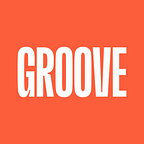Solopreneur-ing with ADHD
Part Four: Externalizing Motivation with ADHD Accountability Buddies
How can a solopreneur balance creating and leading a company with fostering relationships with family and friends — all while managing the symptoms of ADHD? One strategy Groover Paul Girgis uses to find balance and accomplish his goals is Accountability Buddies (also know as body doubling). Here’s a bit more about Paul and all that he does:
Paul Girgis is a founder at OnCenter, a strategy studio that brings design into the boardroom to cultivate space for wise decisions and growth. Prior to OnCenter, he lead RXBAR’s org design team, launched a health-and-safety startup for restaurants during COVID, and marketed new products at Steelcase. His work in innovation, marketing, and design has taken him to NYC, Grand Rapids, “Happy Valley” PA, and now confidently settled in Chicago. If he’s not in front of a screen, he’s likely riding a road bike, baking bread, or being the Fun Uncle to his nine nieces and nephews.
Groove: Can you tell us about your experience with ADHD?
Paul: I was diagnosed with ADHD when I was 21 in college by Penn State’s Psychological Services Center. I did not do anything with that diagnosis for nine or ten years. I took some medications, went on from school, and didn’t really embrace my diagnosis.
As a working professional (now as a founder and of a strategy consultancy here in Chicago), my time, and my focus, is much more precious than ever before in my life. Over the past six months, working with therapy, working with a coach, working with a psychiatrist, I’m just getting much more in tune with accepting that this is how my brain works. I’m creating systems, tools, mindsets to help support the work that I want to do and need to do, as well as the relationships I’m in. So, I’m on a journey recently of accepting and embracing it.
Groove: What are the biggest challenges you face in your creative and career pursuits with ADHD? At the same time, do you feel that ADHD can help you in your creative or career pursuits?
Paul: Challenges of ADHD: It’s focus. I’m now in a sales role as a founder, trying to be very targeted with who I talk to, why, and what messages I share. There’s now more pressure around sales, revenue, and getting new clients. Whereas with other projects like design work, innovation requires a different set of skills.
I’ve gotten by, but I want a new level of success that I’ve never had before, or I’ve never been as precise about. My career in my early twenties has been made of varied experiences — but now I’m looking to execute with excellence and consistency.
On the other hand, because I have been interested in so many different things, I have a very deep understanding of a lot of different skills. Since I was a kid, when I get interested in something, I become obsessed until I consider myself an expert in the craft — and then generally I move onto another skill.
What are the strategies and methods that have helped you overcome the challenges of ADHD?
Paul: I did nothing for a very long time, just white knuckled it, didn’t really take my diagnosis seriously, then really forgot about it for a long time. When I needed to focus my day hour to hour in my current founder and sales role, I realized I needed to accept my diagnosis (which is maybe the hardest part?)
Groove has been really helpful for me in getting into the flow. Externalizing that motivation by scheduling Grooves, and having that social accountability in the Groove community is also really helpful.
I paid for a subscription to Inflow, which is a cognitive behavioral therapy based app to help people with ADHD. It’s kind of like Headspace for people with ADHD. I’ve also read a couple of books on time management — including one that Taylor (Groove’s Head of Community) recommended called How to Break Up With Your Phone.
I also exclusively use a calendar. If it’s not on the calendar, it doesn’t exist.
Groove: How does Groove help you stay more focused and help you get into the flow?
Paul: Groove helps me externalize my motivation. Having other people ask me how the fifty minute session went is really helpful. There’s also times when I think, “I don’t want to do this thing.” I hop on a Groove, and that helps me find motivation, or at least gives me the environment or contained amount of time to get certain things done. Whether it’s cleaning certain parts of my home, sending a certain number of emails, doing a thing I just don’t want to do, Groove helps me get things done.
Is there anything else you would like to share?
Paul: On the days I’m working from home I especially love using Groove. It makes working from home a more social experience — and that makes all the difference.
Looking for more Groovy content? Check these out:
- The SEO Solopreneur’s Toolkit
- What We’ve Learned After Four Months of No Social Media
- Or, if you’re looking to make working solo ➡️ social, cruise on over to groove.ooo to join our beta community 🏄🏼
